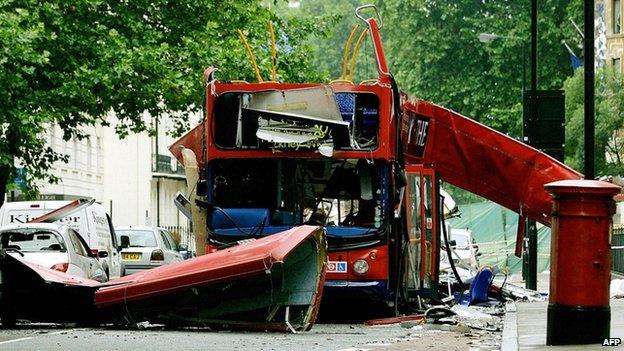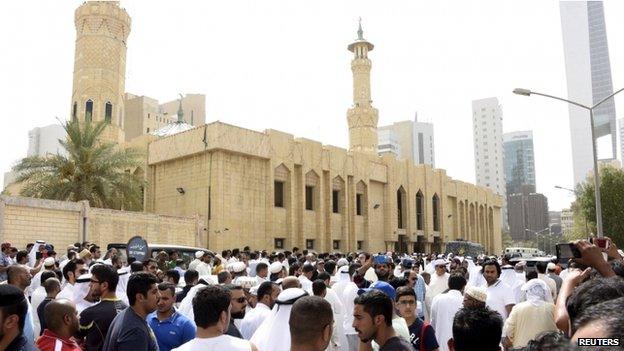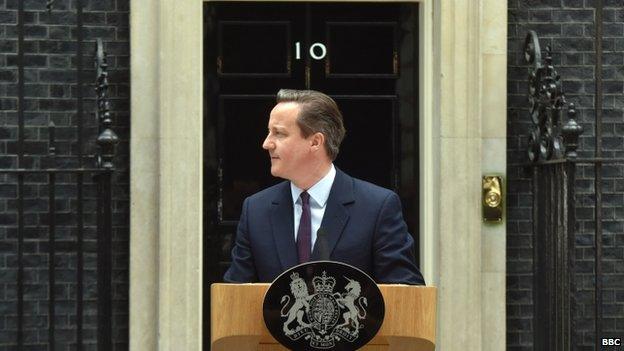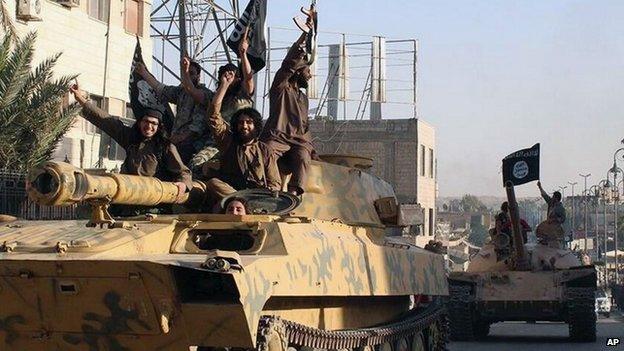Cameron is not asking the big question on Islamic State
- Published
- comments

Hundreds of people were injured and 52 died in attacks in London on 7 July 2005
The continued rise of violent, anti-Western, Islamic fundamentalism is one of the defining challenges of our time.
There is no lack of emotive words and stirring phrases from politicians around the world - it is questionable if they have a coherent strategy to counter it.
The horror in Tunisia came a few days before the 10th anniversary of the London bombings, external, which killed 52 people and injured about 700.
This year, there have also been shootings at the Charlie Hebdo office in Paris and a cafe in Denmark.

The bomb in Kuwait exploded during Friday prayers
But most of the victims of Islamist attacks are Muslims, in the Middle East.
Last week, 27 died in the bombing of a mosque in Kuwait, external, and about 140 civilians were murdered in the Kurdish Syrian town of Kobane, external.
Every year, the threat gets more serious, more brutal and, to some, more attractive.
'Existential threat'
The UK Prime Minister, David Cameron, says he believes this is "the struggle of our generation" and it can be beaten, over time, if we "show extraordinary resolve and strength".
Mr Cameron has also said that Islamic State (IS) is a "perversion of the religion of Islam" - a "poisonous death cult" that poses an "existential threat".

One has to have a fairly lurid imagination to envision that IS could snuff out the UK.
If it really were on the cards, if the flag of IS could one day flutter over Downing Street, if Abu Bakr al-Baghdadi poses the same level of threat to our nation as Hitler or Napoleon once did, you might expect some pretty dramatic, out-of-the-box thinking to be on display.
Mr Cameron's proposals for "a full spectrum response" are very familiar - this of course does not make them wrong, but the portentous pronouncements do not seem to be matched with radical policies.
We have heard about increased security, more intelligence, a pinch of military action, and a long-lasting battle of values before.
It is perhaps telling that Mr Cameron objects to the BBC using the phrase "Islamic State", he prefers Isil - which stands for Islamic State in the Levant - or the preface "so-called".
No doubt there will be a big debate about this, but personally I loathe that phrase.
It is only used in ordinary conversation in scorn: "Your so-called girlfriend."
Rehman Chishti says the militant group known by terms such as Islamic State or ISIL should be referred to as Daesh
And, it seems to me, once we start passing comment on the accuracy of the names people call their organisations, we will constantly be expected to make value judgements. Is China really a "People's Republic"?
After the Scottish referendum, is the UK only the "so-called United Kingdom"? With the Greek debacle, there is not much sign of "European Union".
But it also obscures an important truth.
Critically, IS has ambitions to rule, not just destroy.
It controls vast areas of Syria and Iraq and has more than mere footholds in Libya, Yemen and Nigeria.
'A state of mind'
However understandable the desire to hold the words "Islamic State" at arm's length, using the verbal rubber gloves of "so-called", the name itself is doubly appropriate.
An aspiration to be not simply a nation state but a supranational one - a worldwide caliphate, it is also a state of mind - an inspiration to lone wolves and those who want to travel to join the pack, from mad malcontents to the deeply disconnected.
And, paradoxically, the fact that "Islamic State" is a geographical and political entity makes it easier to imagine its collapse or destruction.
Mr Cameron talks of air strikes squeezing IS at source - although, of course, the Iraqi source, not the Syrian one.

The state of mind that allows IS to grow is potentially more problematic and could well flourish even if Islamic State were to be beaten in Syria and Iraq.
Mr Cameron has talked of taking on an extremist narrative that falls short of advocating violence at home.
If the effort is focused on Bradford that is one thing - if he is telling allies in Saudi Arabia and Pakistan to abandon core beliefs, that is a far more serious attempt to deal with the roots of the problems.
Maj Gen Tim Cross, the most senior British solider, external to serve in the reconstruction of Iraq, sees IS as an organisation with imperial ambitions, a deliberate attempt to reconstruct the Ottoman Empire, growing against the background of a historic clash between Saudi Arabia and Iran, Sunnis and Shia.
'Western aversion'
He says regional powers have to engage more and rich individuals, if not governments, are "feeding the tiger" of radicalism.
"They've got to take it seriously, got to get engaged - this is not a small number of nihilists, it is a deeply ingrained issue," he says.
He makes the point that this could be the Middle East's version of Europe's 30-year war - not just that it was a lengthy religious war that killed a quarter of the population, but that it eventually did end in a peace deal, which created modern Europe, external.
But there is a critical element that is often ignored, a Western aversion to what should be obvious and beyond debate - the appeal of IS is not just an increasingly violent and fundamentalist interpretation of a religion, not just a retreat into the values of the past in the face of the shock of modernity, but an explicitly political reaction to the actions of the West.

What does IS want?

In June 2014, the group formally declared the establishment of a "caliphate" - a state governed in accordance with Islamic law, or Sharia, by God's deputy on Earth, or caliph
It has demanded that Muslims across the world swear allegiance to its leader - Ibrahim Awad Ibrahim al-Badri al-Samarrai, better known as Abu Bakr al-Baghdadi - and migrate to territory under its control
IS has also told other jihadist groups worldwide that they must accept its supreme authority. Many already have, among them several offshoots of the rival al-Qaeda network
IS seeks to eradicate obstacles to restoring God's rule on Earth and to defend the Muslim community, or umma, against infidels and apostates
The group has welcomed the prospect of direct confrontation with the US-led coalition, viewing it as a harbinger of an end-of-times showdown between Muslims and their enemies described in Islamic apocalyptic prophecies

Former Prime Minister Tony Blair rightly said that al-Qaeda had been around before the invasion of Iraq.
But it was not in that country and IS did not exist - nor was there the steady growth of lone wolves in the West.
Of course, this is not all about Iraq but a wider perception of Western policy that goes very much further back.
Radical, anti-colonial Islamic movements were around in the 19th Century - Gen Charles Gordon fell at Khartoum at the hands of one of them.
This is not to argue what is right or wrong or how policymakers should deal with this sentiment.
But to deny it is foolish.
The West's relationship with Islamic radicalism and the Middle East in general has some of the deep resonance of quantum entanglement and is about as easy to understand.
But learning some lessons may be critical for all our futures.